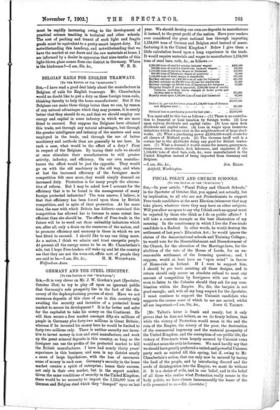FISCAL POLICY AND CHURCH SCHOOLS.
[TO THE EDITOR OF TUB "SPECTATOR."]
Sui,—In your article, "Fiscal Policy and Church Schools," in the Spectator of October 31st, you appeal, not actually, but by implication, to all who are not Protectionists to support Free-trade candidates at the next Election (whenever that may take place), whatever views they may have on other subjects. Will you allow me space to say why I think such an appeal must be rejected by those who think as I do on public affairs P 1 will take a concrete example as the beat illustration of my meaning. In the constituency in which I live the Free-trade candidate is a RadicaL In other words, he would destroy the settlement of last year's Education Act ; he would ignore the claims of the denominational schools and Training Colleges ; he would vote for the Disestablishment and Disendowment of the Church, for the alteration of the Marriage-laws, for the abolition of the veto of the House of Lords, for an un- reasonable settlement of the licensing question ; and, suppose, would at least have an "open mind" in favour of Home-rule in Ireland. If I were to support him, I should be pro tanto assisting all these designs, and in return should only secure an absolute refusal to meet any amount of competition by foreigners with our trade, or even to listen to the Colonies should they ask for any com- bination within the Empire. No, Sir, the bargain is not good enough; and, with all my long respect for the Spectator, I must continue to support the Unionist candidate who supports the causes some of which to me are sacred, whilst all are important. —I am, Sir, &c., JOHN G. TALBOT.
[Mr. Talbot's letter is frank and manly, but it only proves that he does not believe, as we do firmly believe, that while the victory of Protection would mean in the end the ruin of the Empire, the misery of the poor, the destruction of the commercial hegemony and the material prosperity of the United Kingdom, and the corruption of our public life, the victory of Free-trade when largely secured by Unionist votes would not mean the evils he foresees. We need hardly say that we should have greatly preferred a united and powerful Unionist party such as existed till this spring, but if, owing to Mr. Chamberlain's action, that can only now be secured by taxing the food of the people, and by introducing discord and the seeds of disintegration into the Empire, we must do. without it. It is a choice of evils, and in our belief, and in the belief of all those who realise what Protection really means in the body politic, we have chosen immeasurably the lesser of the evils presented to us.—En. Spectator.]






























































 Previous page
Previous page